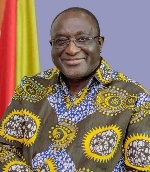Study on ‘Innovative Financing for MSMEs in Ghana’ launched
 By supporting MSMEs, the policies derived from this study are anticipated to generate employment opportunities and stimulate economic growth
By supporting MSMEs, the policies derived from this study are anticipated to generate employment opportunities and stimulate economic growth
The Bank of Ghana, along with two vital institutions, the Development Bank Ghana (DBG), and the University of Ghana Business School (UGBS), have officially commissioned a study on "Innovative Financing for Micro, Small, and Medium Enterprises (MSMEs) in Ghana."
During the launch, Dr. Maxwell Opoku-Afari, First Deputy Governor of the Bank of Ghana, emphasized the central bank's expectations from this study.
He highlighted the importance of gaining a deeper understanding of the financing challenges faced by MSMEs in Ghana, identifying the existing funding gap, and recommending innovative solutions to address it.
Dr. Opoku-Afari expressed confidence that the study would furnish the central bank with a dependable document. This document would serve to inform policies aimed at encouraging innovation in financing for MSMEs, a crucial sector of the economy.
By supporting MSMEs, the policies derived from this study are anticipated to generate employment opportunities and stimulate economic growth.
Below are details of Dr Opoku-Afari’s full address at the launch:
SPEAKING NOTES “INNOVATIVE FINANCING FOR MSMEs IN GHANA” BY DR. MAXWELL OPOKU-AFARI FIRST DEPUTY GOVERNOR BANK OF GHANA
The CEO, Development Bank Ghana
The Dean, University of Ghana Business School
The Secretary and Directors, Bank of Ghana
Colleagues from UGBS, DBG and Bank of Ghana
The Press
Distinguished Guests Ladies and Gentlemen.
Good morning to you all. 1. It is my pleasure to welcome you to this two-fold event, the signing of the Memorandum of Understanding (MoU) between the Bank of Ghana and the Development Bank Ghana (DBG), the first of its kind, and the launch and commissioning of the study on “INNOVATIVE FINANCING FOR MICRO, SMALL AND MEDIUM ENTERPRISES (MSMEs) IN GHANA”.
2. Credit is critical for every economy, particularly developing economies such as Ghana. Both theory and empirical literature point to the nexus between credit and economic growth.
3. As a central bank, though price stability remains our primary mandate under the inflation targeting framework, economic growth through credit expansion is also of key concern to us, and that is why a major consideration is given to the impact of our policies on the real sector. For instance, much of the reforms that have been initiated within the banking sector in particular, have been geared towards creating sound, stable, well-capitalised and profitable institutions capable of supporting the real sector and economic growth through increased lending.
4. Historically, banks have been conservative in their lending to MSMEs due to the perceived high risks associated with lending to them. This risk aversion of banks has been exacerbated by the global and domestic shocks that the economy has had to grapple with in the past four years, starting with COVID-19, to the geopolitical tensions between Russia Page | 3 and Ukraine, and the macroeconomic challenges, all of which culminated in the Domestic Debt Exchange Programme (DDEP) in 2022-2023.
5. All these developments have necessitated the introduction of policy and regulatory reforms to encourage lending to critical sectors of this economy, such as MSMEs. For instance, the establishment of the regulatory framework for development finance institutions in Ghana by the Bank of Ghana, under which the Development Bank Ghana was licensed to operate was also to encourage lending to critical sectors of the economy through Participating Financial Institutions (PFIs) such as banks and also to provide guarantees and other derisking schemes which will moderate the risks associated with lending to sectors perceived to have high credit risk and help close the funding gaps that characterise these sectors. Despite these efforts, the funding gap still persists.
6. It is on this background that we are excited to be part of today’s landmark event, which is yet another bold initiative between the Bank of Ghana and two critical institutions in our country, the Development Bank Ghana (DBG) and the University of Ghana Business School (UGBS) to formally commission this study on “INNOVATIVE FINANCING FOR MSMEs IN GHANA”.
7. The expectation is that this study will promote understanding of and also provide anecdotal evidence on the financing challenges that MSMEs face in Ghana, the funding gap that currently exists and also recommend new and innovative ways of closing this funding gap.
8. At the end of the day, this study will provide us with a reliable document which will inform policy that will encourage innovation in financing for this critical mass of our economy, the Micro, Medium and Small Enterprises (MSMEs), and by that create employment and spur economic growth.
9. One sure way of delivering on credit to MSMEs is via digitalization. Exploring the powerful reach and potential of digitalization to address all the myriad of challenges that have Page | 4 undermined access to credit by MSMEs—especially the lack of collateral. Some work is already being done on this, and again in collaboration with DBG and Monetary Authority of Singapore (MAS) to explore the use of Universal Trusted Credentials (UTC) to establish willingness to pay and facilitate credit delivery to MSMEs. So far, the results from the sandbox is extremely encouraging.
10.It is for this reason that I am extremely excited that one of the key objectives of this Project is to explore which fintech innovations work and how they can be scaled up to ensure the growth of MSMEs.
11.My excitement stems from the fact that innovations through Fintech remain top on the agenda for the Bank of Ghana and that is why a lot has gone into developing the regulatory framework and providing the conducive environment for innovation by players.
12.Results from this study will inform us, the regulator, on other ways in which Fintechs can be used to channel resources from surplus spending units to deficit-spending units in the economy, especially MSMEs
13.The Bank of Ghana assures the project team of its commitment to this collaboration with DBG and we believe the success of this collaboration would encourage other collaborations aimed at addressing the challenges that face the financial sector in particular and the economy as a whole.
14.The Bank of Ghana also commits to observing the MoU in utmost good faith to ensure the study is successful.
15.The Bank stands ready to support in any other way to ensure the project’s objectives are attained at the end of the day.
Thank you for your attention.
Trending News

May Day: I acknowledge challenges faced by workers – Kyerematen
10:15
CMG arson attack: Media fraternity too quiet - Security expert
15:16
NDC Communications Officer foresees victory for Nkoranza South MP
14:48
ECG workers walk out during Ashanti Regional Minister's May Day address
06:30
Bawumia not truthful – Osofo Kyiri Abosom
06:52
SML-GRA deal: NDC’s call for prosecution unfounded – Majority caucus
13:33
Dr Yaw Twum awarded at 2024 annual Zenith Global Health Award
02:40
Bawumia must be truthful with the people of Eastern Region on his campaign tour – NDC
14:31
Bawumia vows free tertiary education for PWDs
13:09
Probing Cecilia Dapaah for money laundering 'baseless, unnecessary' – AG tells EOCO
21:16



